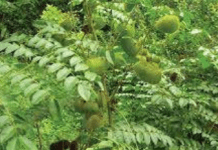
Vitex doniana (Fam. Lamiaceae) is a tree crop that grows in open woodland and savannah regions of tropical Africa. It is the commonest of the Vitex species in West Africa. It is locally called dinya in Hausa, ucha koro in Igbo, and oori-nla in Yoruba. The fruits are also referred to as black plum, African olive, purple plum, Java Plum, West African plum.
Constituents
Several studies report that black plum fruit is high in fibre, protein and ash contents; it is low in fat, carbohydrate and calorie. It is a good source of vitamins, such as Vitamin A, B1, B2, B6 and C; as well as minerals such as calcium, iron, magnesium, phosphorus, potassium, Omega-3 fatty acids and Omega-6 fatty acids.
A wide range of phytonutrients have also been reported. These include iridoid, diterpenoid, ecdysteroid, flavonoid and phenolic compounds.
Preparations
Vitex doniana may be available or used as the pulp, peel, juice, bark, pastes, decoctions, dried fruits and syrup. It is used for making traditional candies, called alewa, in northern Nigeria. The fruits may be boiled, roasted or dried while the leaves may be boiled, macerated or dried.
Pharmacological actions and medicinal uses
Studies show that all the plant parts (root bark, stem bark and leaves) possess significant therapeutic properties, justifying their use in folklore medicine. Vitex doniana has been reported to have anti-inflammatory, antibacterial, antifungal, antioxidant, anticancer and antidiabetic properties.
Studies have reported that the plant is effective in treating diseases and improving female health. It has been used for the treatment of mastalgia, menstrual bleeding problems, back ache, amenorrhea, menorrhagia, luteal insufficiency and premenstrual syndrome. The moderate calcium content makes it useful for the management of oesteomalacia. The bark is also used against leprosy and liver diseases, and to control bleeding after childbirth.
Vitex doniana is used in traditional medicine for the treatment of several ailments, including conjunctivitis, skin rashes due to measles or chickenpox, respiratory infections, abdominal disorders and diarrhoea. The fruit is used to improve fertility and to treat anemia, jaundice, and dysentery. The root is used for treating gonorrhoea.
In some communities, the mature leaves are used for the treatment of malaria, stomach ache, painful menstruation, burns, sterility, diarrhoea, sore eyes, haemorrhoids, ulcers and dermatosis. The bark is utilised for the treatment of sterility, haemorrhoids, dysentery, upset liver, cough, diarrhoea, and dermatosis. Stem and bark extract are used for the control of hypertension. Health benefits of black plum include reduction of cholesterol, protection of the liver against noxious substances and improvement of bone and muscle health. The antimicrobial properties of Black plum helps in the healing of wounds and cuts and also replacement of worn out tissues.
Adverse effects
Excessive intake of plum juice could cause flatulence, indigestion and bloating. Allergic reactions may be experienced from eating plums because of the presence of a potential allergin showing immunoglobulin E (IgE)-specific reaction.
Economic uses and potentials
Vitex doniana fruit pulp could be promoted as carbohydrate and lipid supplements for cereal-based diets in rural communities. It may be considered as a cheap source of raw material for juice production. It can also be fortified into feed of animals like ruminants and birds. The syrup is sold at ₦5000.00/litre. One seedling costs about ₦3,000.00.
Vitex doniana has potentials in agriculture, food, beverages, pharmaceuticals and transport through cultivation, harvesting, research and development of medicines as well as distribution of the plant parts and the products of their processing. It is also useful in animal feeds. Efforts should be made to promote domestic cultivation of Vitex doniana.
References
Iwueke, A.V., Nwodo, O.F.C and Okoli, C.O. (2006). Evaluation of the anti-inflammatory and analgesic activities of Vitex doniana leaves. African Journal of Biotechnology Vol. 5 (20), pp. 1929-1935, 16 October, 2006
By Pharm. Ngozika Okoye MSc, MPH, FPCPharm
(Nigeria Natural Medicine Development Agency)
Email: ngozikaokoye@yahoo.com










